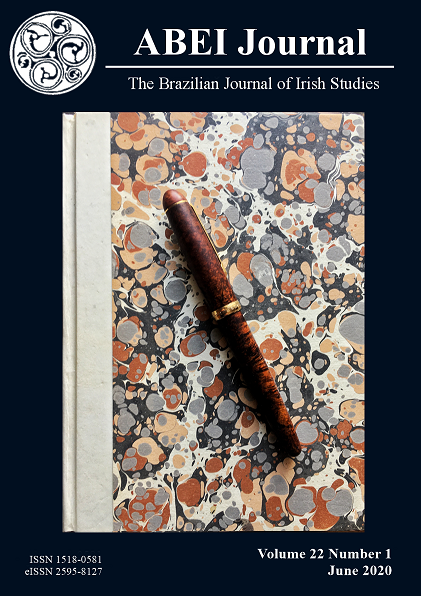Banville e Lacan: A Questão das Emoções em The Infinities
DOI:
https://doi.org/10.37389/abei.v22i1.3854Palavras-chave:
Banville e Lacan, Emotions, The Infinities, Objeto a, Pulsão escópica, O real libidinalResumo
Banville e Lacan são intérpretes freudianos do mundo pós-moderno. Ambos substituem a dicotomia físico-metafísica clássica pelo foco na materialidade da comunicação em um mundo emofísico. Ambos traçam a diferentes maneiras pelas quais os fluxos libidinais combinam partes do eu e vinculam o eu a outras pessoas e objetos. Essas interações ocorrem em três larguras de banda da percepção, que são reorganizadas pelo objeto misterioso a. Esse “objeto” desperta os afetos do inconsciente que infundem as formações identitárias com nova energia. Neste artigo, veremos brevemente como o objeto a é percebido em The Book of Evidence, Ghosts e Eclipse, a fim de focar em como ele funciona em The Infinities, especialmente nas relações entre Adam Godley Júnior e Sênior, Helen e Hermes.
Referências
Banville, John. The Book of Evidence. London: Minerva, 1994.
---. Ghosts. London: Minerva, 1993.
---.. Eclipse. London: Picador, 2000.
--- The Infinities. London: Picador, 2009.
Barthes, Roland. “Le Plaisir du texte.” Oeuvres completes IV. Livres, Textes, entretiens 1972-1976. Nouvelle edition revue, corrigée et présentée par ‘Éric Mary. Paris: Seuil, 2002; 219-261.
Brousse, Marie-Hélène. “The Drive”. Reading Seminar XI. Lacan’s Four Fundamental Concepts of Psychoanalysis. Ed. Richard Feldstein, Bruce Fink, Maire Jaanus. New York: State University of New York Press, 1995; 99-117.
Coughlan, Patricia. “Banville, the feminine, and the Scenes of Eros.” Irish University Review: a journal of Irish Studies 36.1 (2006): 81-101. Literature Resource Center. Web. 11 Mar. 2012.http://go.galegroup.com/ps/i.do?id=GALE%7CA147928074&v=2.1&u=leuven&it=r&p=LitRC&sw=w
Feldstein, Richard. “The Phallic gaze of Wonderland” Reading Seminar XI. Lacan’s Four Fundamental Concepts of Psychoanalysis. Eds. Richard Feldstein, Bruce Fink, Maire Jaanus. New York: State University of New York Press, 1995. 149-174.
Földváry, Kinga. “In Search of a Lost Future: The Posthuman Child.” European Journal of English Studies, 18:2, (2014); 207-220, DOI: 10.1080/13825577.2014.917008
Flaubert, Gustave. “Letter to Louise Colet.” https://www.etudes-litteraires.com/flaubert-art.php
Johnston, Adrian. “The object in the mirror of genetic transcendentalism: Lacan’s ‘objet petit a’ between visibility and invisibility” Continental Philosophy Review vol. 46, 2013; 251–269.
Lacan, Jacques. Séminaire VII (1959-1960). L’éthique de la psychanalyse. Paris: Seuil, 1986.
---. Séminaire XI (1964). Les quatre concepts fondamentaux de la psychanalyse. Le Champ freudien . Paris: Seuil, 1973.
---. Le Séminaire XX (1972-73). Encore. Le Champ Freudien, Texte établi par Jacques-Alain Miller. Paris, 1975.
O’Connell, Mark. “The Empathic Paradox. ThirdPerson Narration in John Banville’s First Person Narratives.” Orbis Litterarum, Vol. 66, issue 6; 2011; 427-447. https://doi-org.kuleuven.ezproxy.kuleuven.be/10.1111/j.1600-0730.2011.01027.x
---. “On Not Being Found: A Winnicottian Reading of John Banville’s Ghosts and Athena.” Studies in the Novel, 43: 3, 2011, 328-342.
Radley, Bryan. “John Banville’s Comedy of Cruelty.” Nordic Irish Studies 9, 2010, 13-31. https://www.jstor.org/stable/41702647
Ragland, Ellie. “The Relation between the Voice and the Gaze”. Reading Seminar XI. Lacan’s Four Fundamental Concepts of Psychoanalysis. Eds. Richard Feldstein, Bruce Fink, Maire Jaanus. New York: State University of New York Press, 1995; 187-204.
Schwall, Hedwig. “‘Mirror on Mirror Mirrored is all the Show’: Aspects of the Uncanny in Banville's Work with a Focus on Eclipse.” Irish University Review 36.1 (2006): 116-33.
---. “An Iridescent Surplus of Style: Features of The Fantastic in Banville’s The Infinities” in Nordic Irish Studies 9, 2010, 89-107.
Žižek , Slavoj. “The Lamella of David Lynch.” Reading Seminar XI. Lacan’s Four Fundamental Concepts of Psychoanalysis. Ed. Richard Feldstein, Bruce Fink, Maire Jaanus. New York: State University of New York Press, 1995; 205-220.
---. Looking awry: an introduction to Jacques Lacan through popular culture. Cambridge: MIT Press, 1991.
Downloads
Publicado
Edição
Seção
Licença
Copyright (c) 2020 Hedwig Schwall

Este trabalho está licenciado sob uma licença Creative Commons Attribution-NonCommercial 4.0 International License.


